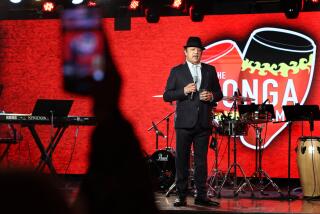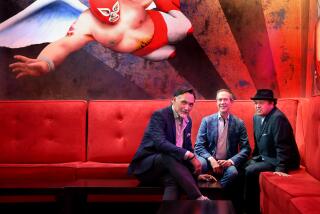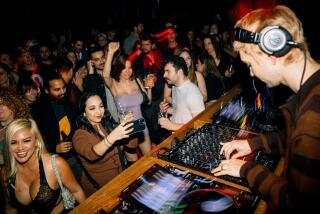‘Then God said, “Hold my beer”’: The inside story of the night that changed L.A. clubs forever
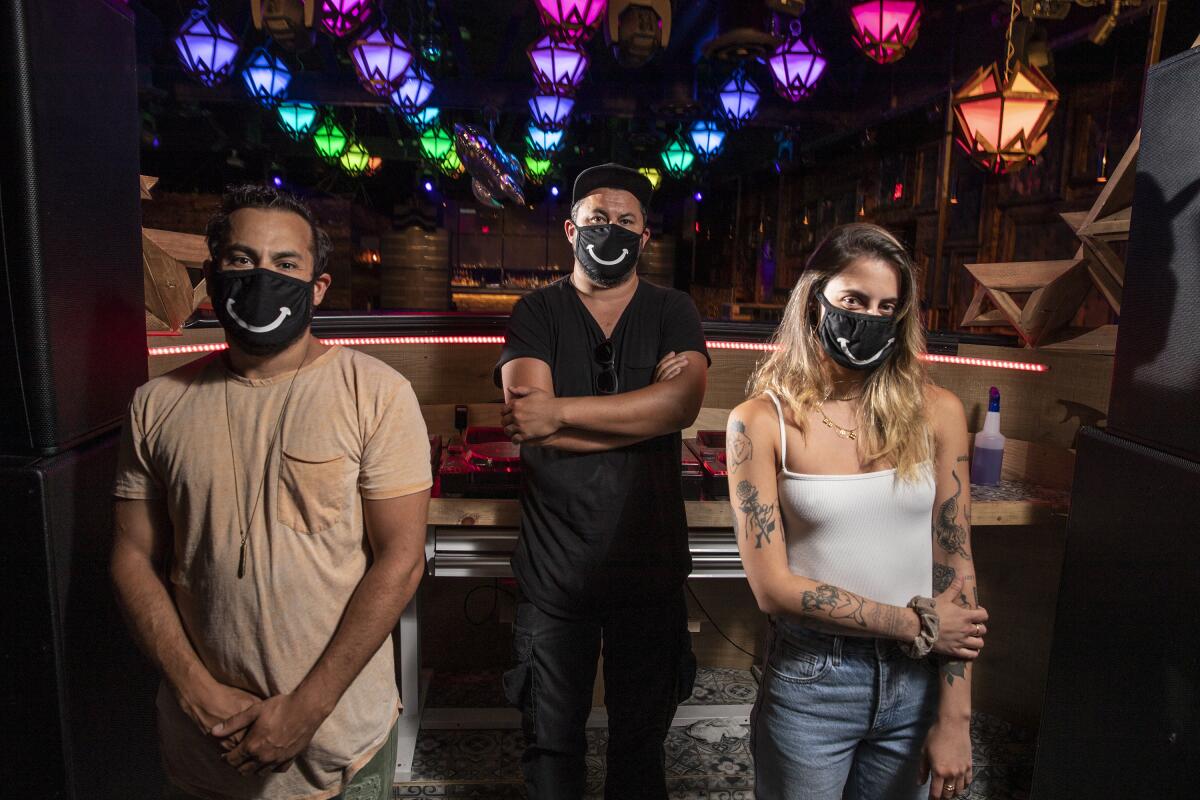
On March 11, the night the NBA canceled its season and Tom Hanks and Rita Wilson announced that they had contracted COVID-19, almost everyone out at a nightclub suspected that something awful was coming. In the span of little more than a day, a city brimming with live music, packed bars and sweaty nightclubs went dark. With them went an entire cultural economy that, for many of those employed there, was their entire life and livelihood.
As California prepares to tentatively reopen businesses, live music and nightlife are two of the industries still on complete hiatus. The Hollywood Bowl is empty for the first springtime in nearly a century. Across the city and the country, concerts will likely not return for the rest of the year. L.A. is only beginning to process the loss — economic, cultural and personal — that occurs when venues close, artists move away and scene makers struggle to stay in touch.
The Times spoke with owners, staff and performing artists at four prominent independent clubs: McCabe’s Guitar Shop, a beloved folk spot in Santa Monica; the Troubadour, WeHo’s legendary rock stalwart; Sound, a techno club in Hollywood; and the Satellite, an indie and alt-comedy club in Silver Lake. They felt the confusion and dread of that night as much as anyone in the city, and their recollections of the past months and insights regarding an uncertain future form this oral history of one of the most surreal and foreboding periods in L.A. music history.
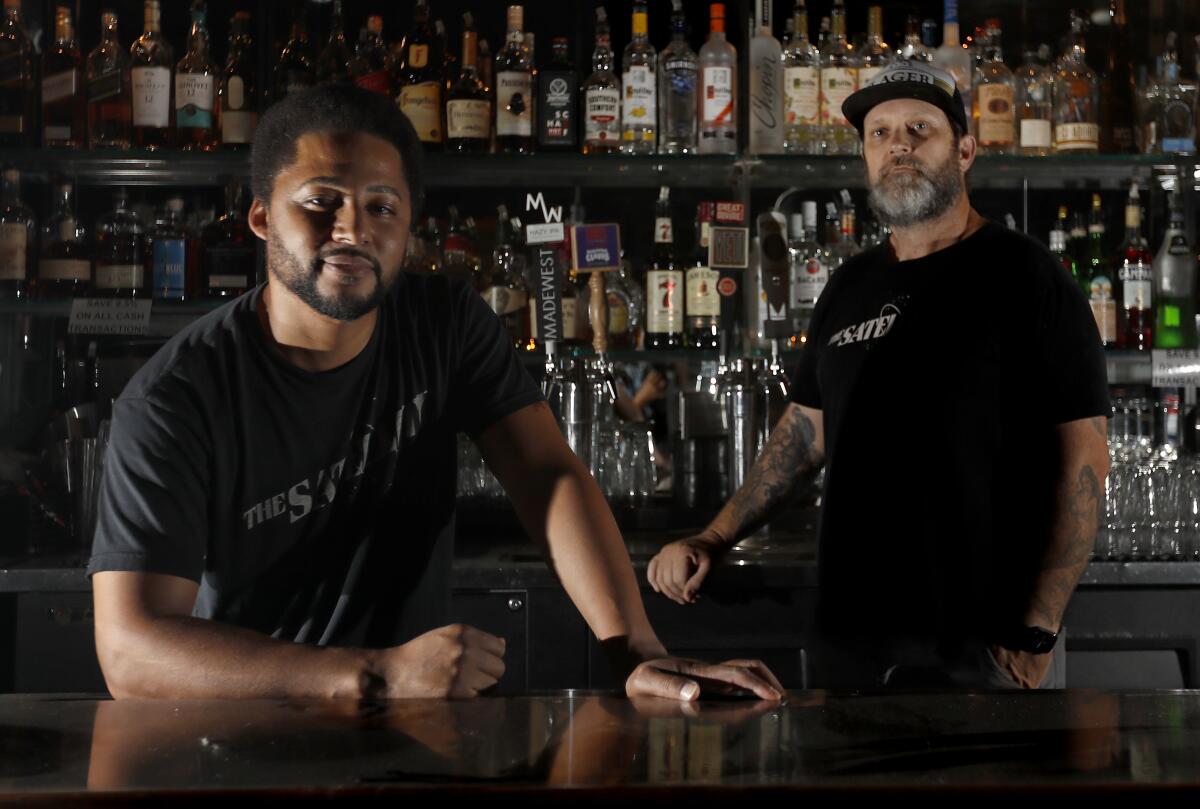
1. MARCH 11: “THIS IS GONNA KILL US”
Jeff Wolfram, owner of the Satellite: We were doing great. We had two dance nights on weekends and were trying to concentrate on newer bands. When SXSW [the South by Southwest festival in Austin, Texas] got canceled, I figured this could be something. It feels dumb now, but I didn’t realize it was going to be as big a deal as it was.
Kora Peterson, event producer of McCabe’s Guitar Shop: This year was starting so great. We had Rufus Wainwright for three nights doing his Audible show. We had Winona Judd. We had this sold-out Holly Near show and Alejandro Escovedo, and Hiss Golden Messenger coming up. It felt like the arc of this year was great, with the people we were getting on the calendar. It was so sad for me to have to dismantle it.
California is slowly reopening, providing hope that you might soon see your favorite artist in concert. But from an arena stage? A computer screen? A drive-in?
Kobi Danan, owner of Sound nightclub: We had three sold-out shows at the club that weekend, promoted a show at the Shrine and had 15,000 tickets sold for the Art of the Wild festival in Las Vegas. We were doing 220 shows a year, 90% were sold out. We had 35 shows planned around Coachella. 2020 was shaping up to be the best year of our company ever. Then God said, “Hold my beer.”
Christine Karayan, general manager of the Troubadour: I wasn’t really paying attention to the rest of the world, because when you do 12-hour days, you’re kind of insulated. We started getting phone calls leading up to the Glass Animals show. “Is it still happening?” “Yeah, sure.” Then we’re like, “Are we doing the show? OK, we’re going to do the show. It’ll be fine.”
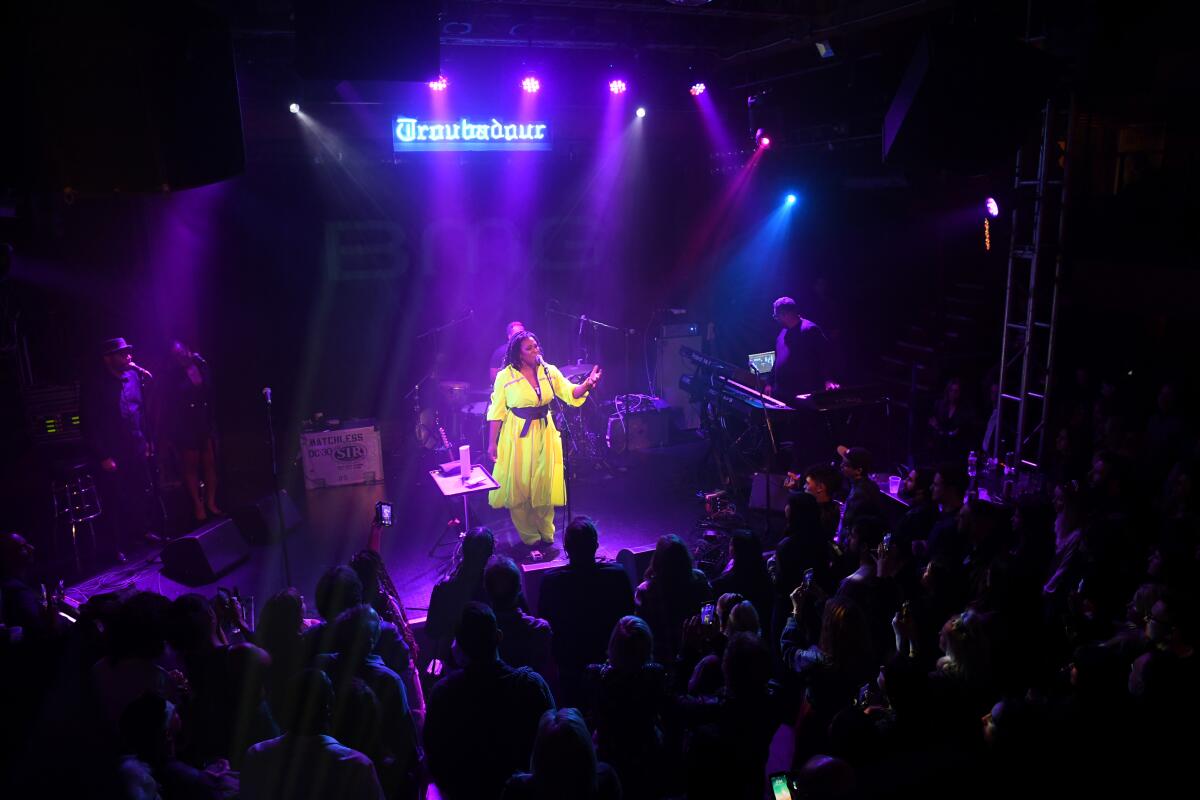
Ashanti Rogers, bar manager at the Satellite: I was trying not to burden [Jeff], but when the NBA shut down, it was like “uh oh,” and the next day two bands canceled. It didn’t really sink in until after the weekend when the governor said no groups over 250, then 50, then 10. I said, “This is gonna kill us, we’re not essential. We’re gonna be the first thing to close up.”
Karayan: I remember my husband going, “You’ve got to be careful.” I’m like, “You’re blowing this all out of proportion. Everything’s going to be fine.” The audience was just excited to be there. There was no, “Is it safe to go in?” I remember coming up to the office after and we were like, “Something weird is happening.” You could feel something changing.
Peterson: That week we had We Five and Kinky Friedman, and before [officials] gave the word banning mass gatherings, we pulled the plug on our shows. We didn’t want to be part of the problem. I spoke to Kinky’s manager, and he was like, “How do you want to play this? We’re happy to do the show if you want us to.” I said, “We love Kinky, so it breaks my heart to do this, but we can’t.” A lot of our patrons are older, and we didn’t want to make them uncomfortable.
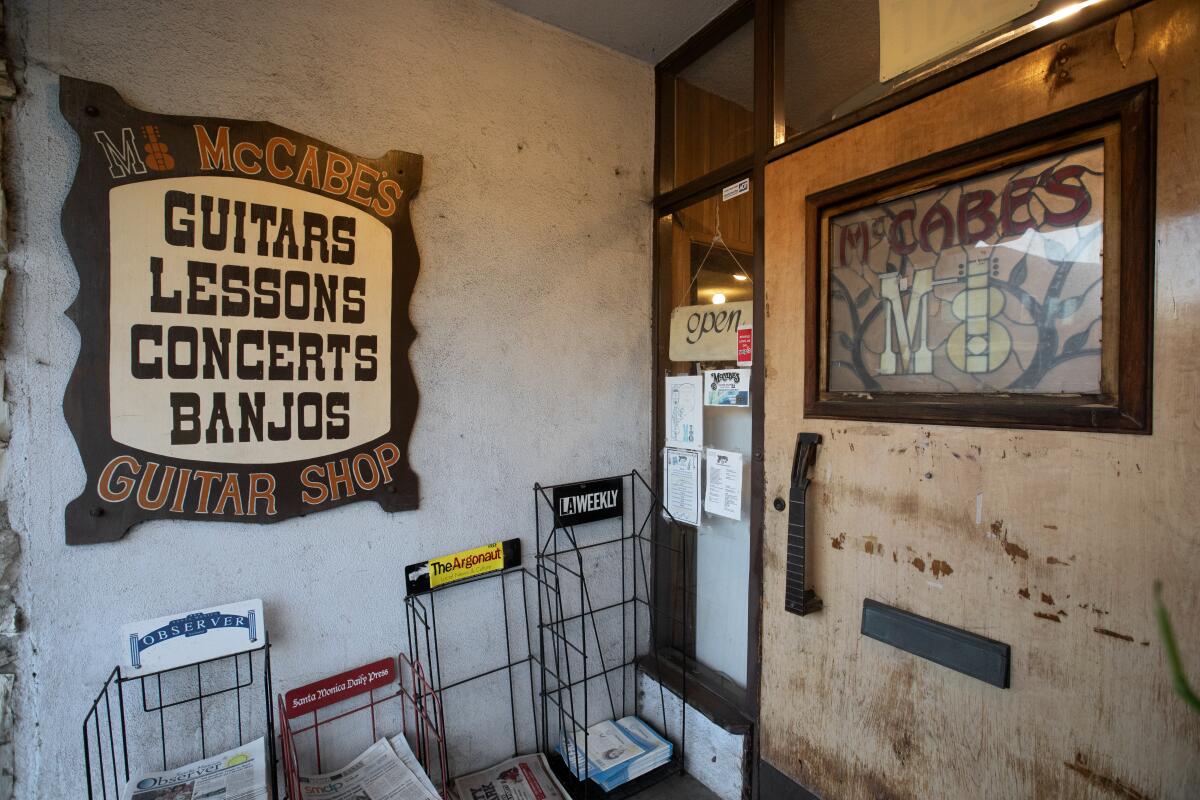
Dave Bayley, singer for Glass Animals, the last band to play at the Troubadour: Right before we went on for the encore, my tour manager Tom came up to me and said, “This is gonna be the last show that anybody goes to in L.A. for a very long time. Do you want to say something about it to the crowd?” I was just like, “Absolutely not. That’s going to send a ripple of panic throughout the crowd.” I just thought, “I have to go for it as hard as I can for these last couple of songs.” I felt like I had a responsibility to make people happy for the last 15 minutes of live music in L.A.
Charley Tichenor, singer for Dirty Cakes, the last headliner at the Satellite: Even as we were prepping for the show, bartenders weren’t taking cash, and they were wearing gloves. I asked for a water and I went to shake their hand and they said, “I’m not touching you.” I’ve been playing live for 15 years. I’ve never had that awareness of living in the middle of something before. We had a line out the door to get in, and by the end of the night, there were maybe 20 people in the room. People walked out to smoke cigarettes and never came back. It ended up being the last stand.
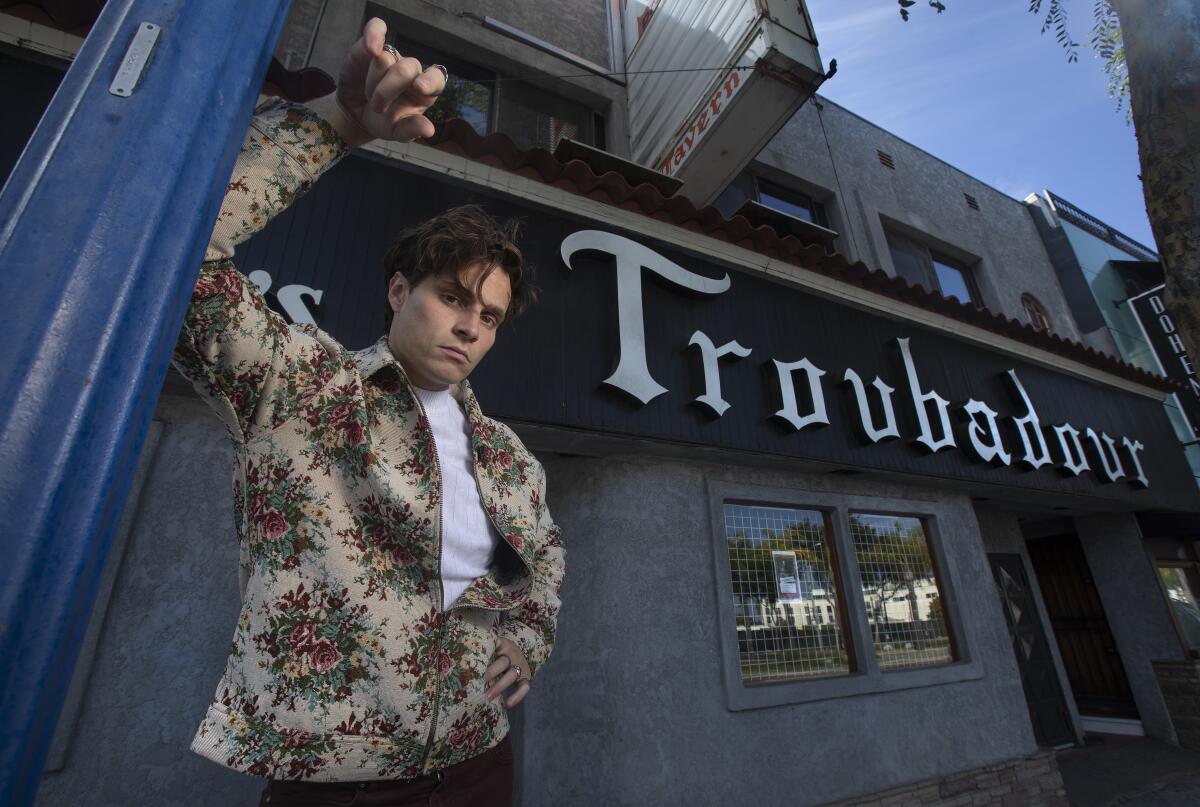
2. THE FALLOUT: “HOLLYWOOD IS A GHOST TOWN”
Bayley: After L.A., we had San Francisco. There are normally, there are loads of people walking everywhere, but it was almost zombie-ish. So we just emptied all our stuff out into the middle of the street to put it in a truck that was going to store it for us, because we didn’t know when we’d be back.
Spencer Sutherland, singer-songwriter, booked to play March 12 at the Troubadour: It was brutal, man. It was shaping up to be the biggest headlining show of my career. And we had some really special guests coming out to sing with me, and a lot of industry people. It was just going to be a magical night, but COVID had other plans.
Karayan: We came in on Monday and said, “Wow, we need to cancel the rest of the month, because whatever this is, it’s clearly bad.” Nobody knew what to do. In my mind, I was like, “Let’s see if we can move all these March shows. We have some gaps here and there in the summer. Let’s see if we can move them into June.” We had a couple of holes in April. And then — excuse my French — the s— hit the fan.
Terrace Martin’s “Pig Feet” was recorded in the last week and features Kamasi Washington, Denzel Curry, G Perico and Daylyt.
Esperanza Riskin, co-owner, McCabe’s Guitar Shop: We had to let go of all of our concert workers. They were all gig workers. It was heartbreaking. Bob [Riskin] and I own the store, and we sat at home, stunned, for two weeks. We were staring at the walls going, “How are we ever going to open again?” We’re not young whippersnappers anymore. We’re both in our 70s. So should we go to the store? Shouldn’t we go to the store? Do we close the store? There’s a 30% chance of us getting it. It’s not pleasant to think that way, but that’s the truth. Isn’t that awful?
Wolfram: We did a lot of day drinking. We came to work every day like, “OK, we’ll paint, do a few things, there’s no money so we’ll do it as cheap as we can.” We’d work for two hours, then take a beer break. It was actually kind of depressing.
Artie Sinaplidis, general manager, Sound: I didn’t think it would last this long. I thought it would be two months and we’d get on with our lives.
Shailee Ben-David, bartender, Sound: To not physically do something kind of made me go insane. But you have relationships with the people who come in to get served by you. Sound put together a GoFundMe, and the amount of people who donated was incredible. It’s helped every one of us pay rent.
Wolfram: We’re in for some really bad times. We’re barely surviving. We’re not even really surviving. It’s getting tough to pay utilities, and we started a GoFundMe for our employees, but right now, I’m not 100% sure we’re gonna make it.
Riskin: The community keeps calling, saying, “You’re going to reopen, right?” I say, “We’re trying, we’re trying.” There was a moment when we thought we wouldn’t. The first round of [the Paycheck Protection Program], we did not get. And the sales right now are not keeping us going, even on the curbside. We got it on the second round. That loan is what’s keeping us going and being able to pay our employees.
Ben-David: People do [music] for the passion of it. Most are not making money off it. This experience has shown how much community we still have for music. People are donating to venues, but how long that’s going to last, we don’t know.
Danan: People on payroll are still on payroll, but the hourly people like security, bartenders, those were affected most. It’s a whole industry that’s built on so many moving pieces, and they all vanished in 24 hours. Hollywood is an absolute ghost town. I’ve never seen anything like it.
Sinaplidis: It feels like the “Twilight Zone” here. I’ve lost track of what day it is anymore.
Danan: I don’t think people know how important [music] is to the economy. They don’t understand how many lives this supports.
Wolfram: People think, “Oh, you own a venue, you must be rich.” No, not at all. Every small venue, we operate on restaurant margins. You don’t make money, but you do it because you love it. I’ve reached out to [Rep.] Adam Schiff and organizations for venues, and there’s been lot of enthusiasm. Live Nation and Goldenvoice will be fine, but indie venues are screwed.
Tichenor: There are people fleeing the city, for rent or money problems or health concerns. Clubs we had gigs at, the buildings are up for sale. I don’t know if things will bounce back, because not everything will be there. I know people who have died of drugs or suicide since this happened, who were going to shows five nights a week. Being in an audience was one of the last things holding them together.
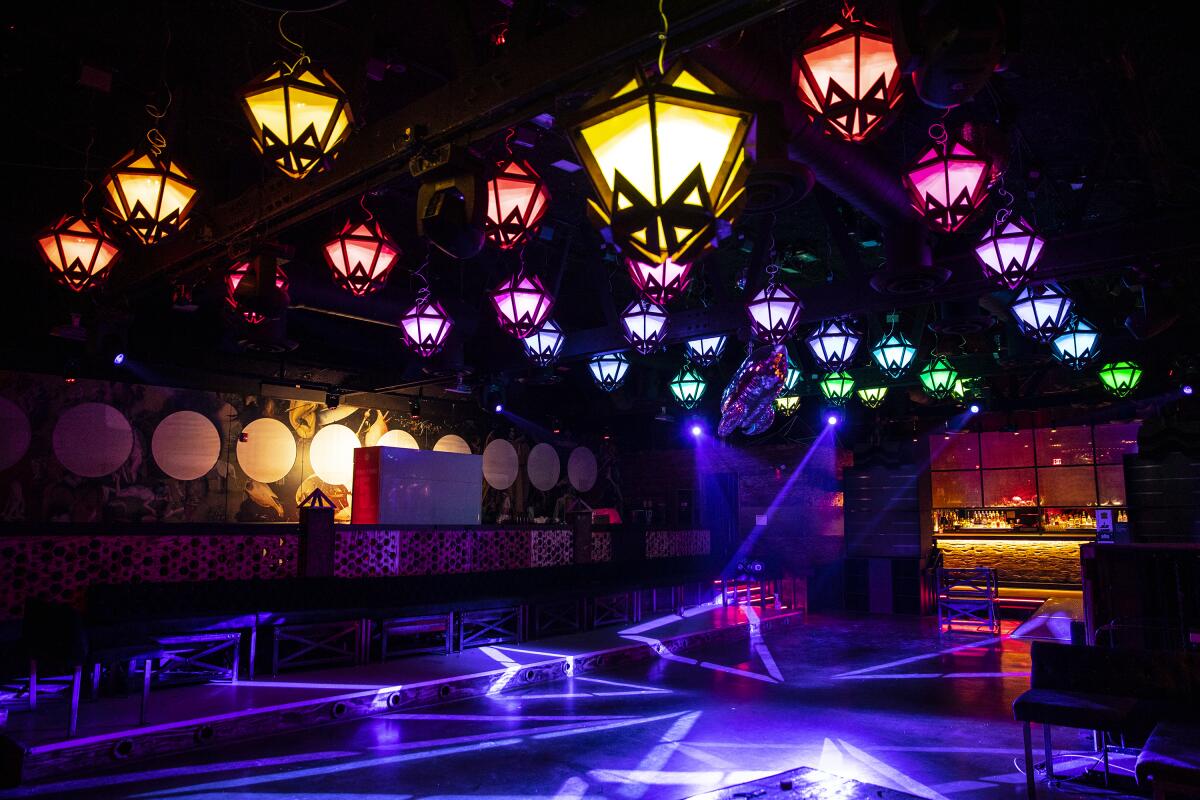
3. THE FUTURE: “WE’RE STARTING FROM GROUND ZERO AGAIN”
Wolfram: Will it take a whole other year? Do we try to open something different? How are people going to feel when we do reopen? Hopefully, it’ll come back, but it might take time until people feel comfortable.
Danan: The club is built for people to meet and rub against each other. That’s where it’s going to get tricky. If there are 200 people in the club, how is that going to feel? Are people going to walk in with measuring tape? If the government issues an order saying we’re allowed to open with 100 people heat-tested at the door, with valid COVID tests, and all precautions taken, we will. But if the government says you have to have cones on the dance floor and plexiglass on the bar, then we’re just not gonna open until it blows over.
Riskin: We’ve handed over the store — sooner than we wanted to — to our daughter and her husband. I can’t endanger my husband by coming in here and possibly getting COVID, and endangering myself. So they’re slowly taking over. It’s like we’re starting from ground zero again.
Wolfram: I’m completely confused, because I have no idea what the government will ask of us. How do you serve people at a bar in a venue when people have to get face to face to scream a drink order? The only thing I see is a lot more automation. Companies are reaching out about robots making drinks on an app.
Sutherland: We postponed [the show] for May 19. We were thinking about August, but we’re like, “Yo, let’s play it real safe. Let’s go right before Halloween.” I know I’m being hopeful, but I don’t think there’s anything wrong with being positive and hopeful.
Wolfram: This isn’t going to be the last pandemic. You know we’ll get another one, maybe in five years, maybe in 50. But it’s something we’ve got to think about now. Live music is going to be something different in the future. Maybe it’s all online. Maybe it’ll suck.
Danan: Hopefully, this will be a distant memory, like “Can you believe we were locked inside and everything was closed?” After it all opens, I’m trying to charge a lot less. I want to do as many shows as we can for as little as possible, so people can blow off all the steam they’re collecting. We had so much before, and you take it for granted. My favorite thing anyone told me was, “I’m never leaving a party early ever again.”
More to Read
The biggest entertainment stories
Get our big stories about Hollywood, film, television, music, arts, culture and more right in your inbox as soon as they publish.
You may occasionally receive promotional content from the Los Angeles Times.
